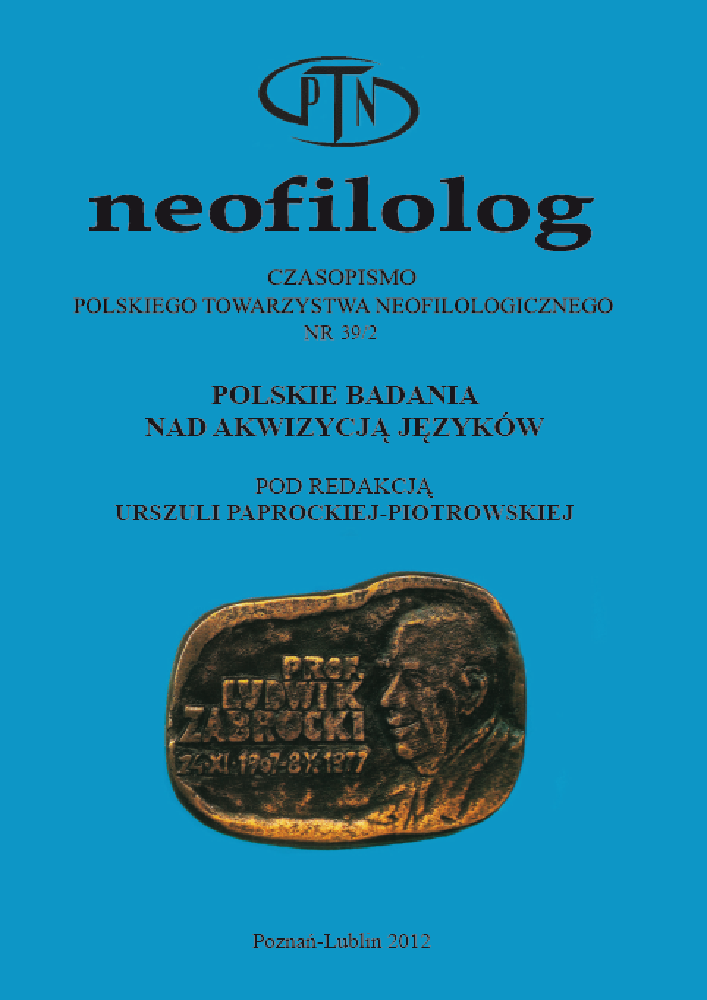Abstrakt
Language learning in cooperation is a social and sociocultural dimension of action-based approach. By means of language education the school prepares students to undertake social activities and to cooperate with native language speakers. Therefore, teamwork teaching and learning, team pursuance of mutual goals with the use of foreign language has become one of the priorities of action-based didactics. We usually talk about positive aspects of teamwork in the context of communication teaching. Team cooperation is less frequently perceived as a form of pursuing another goal of language education, i.e. linguistic competence development. Apart from pursuing communicative goals work in small groups lets the learners get involved in explicit work with language structures, observe and discover language rules, test formed hypotheses in texts they create and master their competencies by reflecting on the language. The purpose of the paper is to present organisational forms of classes applied most frequently in foreign language teaching and learning actionbased process.
Bibliografia
Baggio, R. et al. 2004. „Pourquoi l’apprentissage coopératif pour l’approche Tabasco”.Travaux de didactique du français langue étrangère 51: 51-59.
Brossard, L. 1999. „Entrer dans la construction des compétences”. La vie pédagogique 112: 21.
Ellis, R. 2003. Task-based Language Learning and Teaching. Oxford: Oxford University Press.
Estaire, S. 2009. El aprendizaje de lenguas mediante tareas: de la programación al aula. Madrid: Edinumen.
Gołębniak, B. D. 2004. „Nauczanie i uczenie się w klasie” (w) Pedagogika 2 (red. Z. Kwieciński, B. Śliwerski). Warszawa: Wydawnictwo Naukowe PWN: 158-205.
Griggs, P. 2009. „A propos de l’articulation entre l’agir de l’usage et l’agir de l’apprentissage dans une approche actionnelle: une perspective sociocognitive” (w) L’approche actionnelle dans l’enseignement des langues. Onze articles pour mieux comprendre et faire le point (red. M.-L. Lion-Olivieri, Ph. Liria). Barcelone-Paris: Difusión, Editions Maison des langues: 79-100.
Janowska, I. 2011. Podejście zadaniowe do nauczania i uczenia się języków obcych. Na przykładzie języka polskiego jako obcego. Kraków: Universitas. Kruszewski, K. (red.) 2005. Sztuka nauczania. Czynności nauczyciela. Warszawa: Wydawnictwo Naukowe PWN.
Nunan, D. 2004. Task-Based Language Teaching. Cambridge: Cambridge University Press.
Rada Europy. 2003. Europejski system opisu kształcenia językowego: uczenie się, nauczanie, ocenianie. Warszawa: Wydawnictwa CODN.
Schmidt, R. 1990. „The role of consciousness in second language learning”. Applied Linguistics 11: 129-158.
Skehan, P. 1998. A cognitive approach to language learning. Oxford: Oxford University Press.
Springer, C. 2009. „La dimension sociale dans le CECR: pistes pour scénariser, évaluer et valoriser l’apprentissage collaboratif”. Le français dans le monde – Recherches et applications 45: 25-34.
Wilczyńska, W. 1999. Uczyć się czy być nauczanym? O autonomii w przyswajaniu języka obcego. Warszawa: Wydawnictwo Naukowe PWN.
Willis, J. 1996. A Framework for task-based language teaching. New York: Longman.
Licencja
Prawa autorskie (c) 2012 Iwona Janowska

Utwór dostępny jest na licencji Creative Commons Uznanie autorstwa – Bez utworów zależnych 4.0 Międzynarodowe.
Przedstawiany utwór (artykuł) upubliczniany jest na podstawie umowy z autorem i na licencji Creative Commons Attribution-NoDerivatives 4.0 International (CC BY-ND 4.0).
Użytkownicy mają obowiązek podania wraz z rozpowszechnionym utworem, informacji o autorstwie, tytule, źródle (odnośniki do oryginalnego utworu, DOI) oraz samej licencji;
- bez tworzenia utworów zależnych,
- utwór musi być zachowany w oryginalnej postaci.
Uniwersytet im. Adama Mickiewicza w Poznaniu zachowuje prawo do czasopisma jako całości (układ, forma graficzna, tytuł, projekt okładki, logo itp.).
